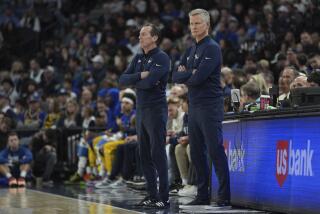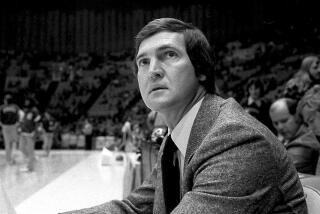What Else Remains for K.C. Jones in the NBA? : Basketball: He’s a Seattle assistant after winning in college and in the pros. But he will answer the phone of teams looking for a head coach.
- Share via
K.C. Jones, still surrounded by green, glides into semi-retirement and, just maybe, the rest of his working life at the same time. That makes as much sense as one of the NBA’s most successful coaches of the 1980s breaking into the current decade by having to remind himself when to speak during timeouts--but it works.
It works very well, in fact. About as well as Jones could have imagined when he left the Boston Celtics, his longtime home, to join the Seattle SuperSonics.
“I’m 58 years old, 59 in May,” explains Jones, who even had a three-year coaching stint Brandeis, where he was 35-32. “Right now, I’ve done it all. I want to keep busy, but I don’t want to ‘do it all’ again.”
At least not now. After winning a gold medal as a member of the 1956 Olympic basketball team, an NCAA championship at the University of San Francisco, eight NBA titles as a Celtic player and two more as Boston coach, he is an assistant coach with the SuperSonics. And, by his own account, perfectly content.
That might sound strange to some, that a boss could become second in command and not mind. But Jones, laid back as ever, does not find it so unusual. He’ll rattle off a few other guys who have done the same thing.
It’s just that none of the other people have Jones’ success.
Therein lies the rub.
“But ego has never been a big thing with me,” he said Sunday. “Why someone with head-coaching experience would make the move to becoming an assistant, there are different reasons. Some want a chance to get back again. Others just like the position. It doesn’t matter about your personality, it only matters what you want to do.”
And K.C. Jones wants to do this. It’s important to note he wouldn’t have become an assistant for anyone except Bernie Bickerstaff, his good friend. Now that he is here, having left the glory of the Celtics for a franchise that hasn’t won a best-of-seven playoff series since 1987, Jones is enjoying it.
But for how much longer?
As Bickerstaff’s assistant, he probably has an open-ended lease.
The matter of becoming a head coach again is far less certain. Jones has a never-say-never policy, which means if the Clippers or Charlotte or another team wants to call during the summer, he’ll pick up the phone. He may not run to answer, but no suitors will get a busy signal from the start.
“I’ll listen,” said Jones, the subject of speculation regarding jobs at Sacramento and New Jersey last summer though he said there was no contact with either.
The Jones-Bickerstaff relationship goes back nearly 20 years. A year after he was an assistant to Bill Sharman on the 1971-72 Laker team that won a record 33 consecutive games and the NBA title, Jones became head coach of the American Basketball Assn.’s San Diego Conquistadors. There he met Bickerstaff, who not long before had turned down an offer to play for the Harlem Globetrotters to coach his alma mater, the University of San Diego.
When Jones took over the then-Capital Bullets, the same team that exists today under a different prefix, Bickerstaff came as an assistant. In 1974, the Bullets reached the NBA final before losing to Golden State.
Jones was eventually fired, and the two went their separate ways. The coach returned to Boston, the assistant stayed in Washington under Gene Shue and Dick Motta. After 12 years, he moved to Seattle to become a head coach, too.
Jones coached the Celtics eight seasons, winning seven division titles. What happened next is subject to interpretation. Jones said he resigned to become vice president of basketball operations; others claim he was kicked upstairs to make room for Jimmy Rodgers on the sideline.
Jones stayed in the front office one season. The desire to coach never left.
“It was not time yet,” he said.
When Bickerstaff called last summer, he didn’t have to ask Jones twice to come to Seattle. The friendship, the working relationship, made it good for both--the even-tempered Jones and Bickerstaff, who missed six games last season and was also hospitalized because of an ulcer. United they sit, again.
There were no major adjustments. The biggest belonged to Jones, who had to resist the reflex action to speak up at certain times. Times when the head coach should speak.
“It was difficult in the beginning in that regard,” he said. “But as the games would go by--the first 10 or 12--I got the knack. I don’t have to use the zipper anymore.”
In other words, the former No. 1 has no problems at No. 2.
“It’s not a question of missing anything much,” K.C. Jones said. “It’s just a question of being in the game.”
More to Read
Go beyond the scoreboard
Get the latest on L.A.'s teams in the daily Sports Report newsletter.
You may occasionally receive promotional content from the Los Angeles Times.










